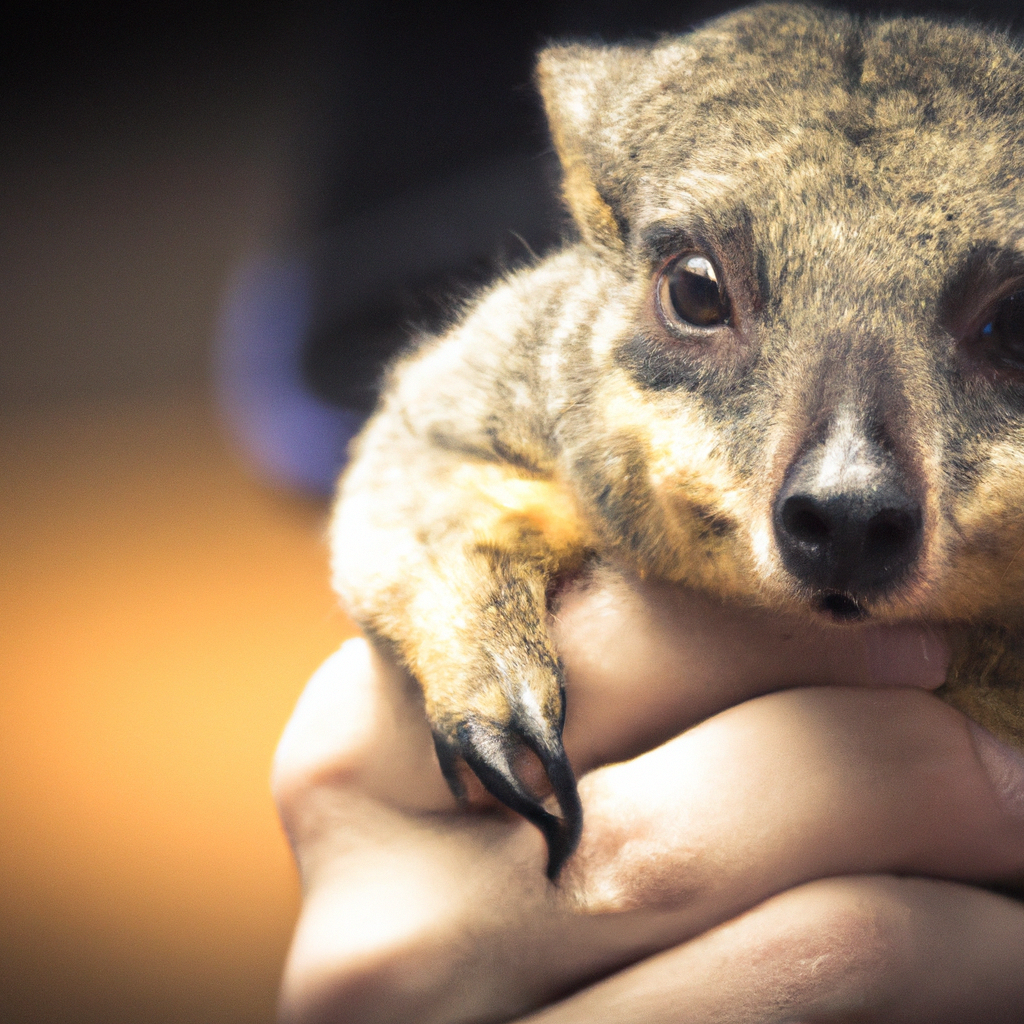In a world where cats and dogs are often deemed as our most faithful companions, some of us find solace in the allure of the extraordinary. The curious souls among us yearn for the companionship of creatures that defy convention, animals that bring an exotic touch to their lives. While whimsical and enchanting, caring for these unique creatures requires a delicate balance of knowledge, dedication, and understanding. From the vibrant scales of a tropical lizard to the mesmerizing feathers of a captivating parrot, this article delves into the realm of exotic pet care, shedding light on the extraordinary needs and challenges involved in providing them with a nurturing and fulfilling life. Prepare to embark on an eye-opening journey, where the extraordinary meets the everyday in a symphony of responsibility and wonder. Let us delve into the world of exotic pet care, where meeting the needs of unique animals becomes an art form in itself.
1. Unleashing a Jungle at Home: How to Provide Optimal Care for Your Exotic Pets
Creating a jungle-like habitat for your exotic pets can be an exciting and rewarding experience. By providing them with optimal care, you can ensure their well-being and foster a thriving environment. Here are some tips to help you unleash a jungle at home:
1. Research, Research, Research!
Before bringing any exotic pet into your home, it’s crucial to conduct thorough research. Each species has unique needs and requirements. Gain an understanding of their dietary needs, behavior patterns, and environmental preferences. Seek advice from experts, read books, or join online communities dedicated to these specific pets.
2. Enclosure Design
One of the first steps in creating a jungle-like atmosphere is designing the perfect enclosure. Consider the space requirements and simulate their natural environment. Use natural substrates like coconut husk or moss to mimic forest floors. Incorporate different elements such as rocks, branches, and foliage to create hiding spots, climbing opportunities, and visual barriers.
Don’t forget to incorporate proper lighting and heating systems. Research temperature and humidity requirements specific to your pet, and invest in heat lamps, UVB lights, and misting devices to maintain ideal conditions.
3. Diet and Nutrition
Proper nutrition is essential for your exotic pets’ overall wellbeing. Research their dietary needs and provide a balanced diet accordingly. Emulate their natural feeding habits as closely as possible. Offer a mix of fresh fruits, vegetables, and protein sources suitable for their species.
It’s worth considering live prey, such as insects or small rodents, if recommended for your pet. Always consult with a veterinarian or exotic pet specialist to ensure you meet their nutritional requirements.
4. Environmental Enrichment
Exotic pets often thrive when provided with environmental enrichment. Mimic natural stimuli by introducing toys, puzzles, and objects they can interact with. This helps stimulate their mental and physical abilities, preventing boredom and promoting natural behaviors.
Rotate and diversify the enrichment items regularly to keep things exciting. Introduce new scents, textures, and sounds to engage their senses. Observe their reactions and adjust accordingly to ensure a stimulating and satisfying environment.
By following these guidelines, you can create an ideal jungle-like habitat for your exotic pets. Remember, providing optimal care with attention to their unique needs ensures a happy and healthy life for these remarkable creatures.
2. Unveiling the Secrets of Unique Creatures: Understanding the Complexities of Exotic Pet Care
When it comes to pets, most people envision furry friends like dogs and cats. However, there is a fascinating world of exotic creatures that are increasingly becoming popular companions. From vibrant reptiles to colorful birds, these unique pets require an understanding of their intricate needs and complexities in care.
1. Exploration of Diverse Species: Exotic pets encompass an extensive range of species, each with its own set of requirements. For instance, reptiles like geckos and snakes require specific temperature and humidity levels to thrive, and these conditions must be carefully monitored. Birds, on the other hand, need spacious cages, appropriate perches, and a nutritious diet to maintain their vibrant plumage and overall health.
2. Specialized Habitat Design: Unlike traditional pets, exotic animals often need custom-built habitats. For reptiles, terrariums or vivariums with specific lighting, heating, and ventilation provisions are crucial in replicating their natural environment. Some birds require large aviaries or cages with various levels for exercise and stimulation. Understanding the appropriate habitat for each exotic creature is essential for ensuring their well-being.
3. Nutritional Requirements: Exotic pets often have unique dietary needs that can be quite different from those of dogs and cats. Certain reptiles may require live insects, while others thrive on specific plant-based diets. For birds, a combination of seeds, fruits, and vegetables is necessary to provide the right balance of vitamins and minerals. Accurate knowledge of an exotic pet’s nutritional needs is fundamental in preventing health issues.
4. Veterinary Expertise: Caring for an exotic pet necessitates finding a veterinarian knowledgeable about their specific species. Exotic animals can be more vulnerable to certain diseases or conditions, and a specialized vet can provide the best care and advice. Regular check-ups, screenings, and proper vaccinations are crucial in maintaining the overall health of these unique creatures.
Embarking on the journey of exotic pet ownership can be a rewarding experience, but it requires a commitment to learning and understanding the complexities involved. By delving into the secrets of unique creatures, we can unlock the joy and companionship that these special pets offer while ensuring their well-being remains a top priority.
3. Beyond the Ordinary: Meeting the Unconventional Needs of Your Extraordinary Companions
At our company, we understand that not all companions are the same. Some pets have unconventional needs that require special attention and care. That is why we go beyond the ordinary to ensure we meet the requirements of your extraordinary companions.
Our team of experts is dedicated to providing a personalized approach to each unique companion. Whether your pet has dietary restrictions, specific exercise requirements, or needs specialized medical attention, we have the knowledge and resources to cater to their needs.
When it comes to nutrition, we offer a wide range of specialized diets that are carefully formulated to meet the individual dietary needs of your extraordinary companion. Our team works closely with veterinary nutritionists to develop custom meal plans that provide the essential nutrients and support optimal health.
Exercise is crucial for maintaining the well-being of any companion, but extraordinary pets often require unique forms of physical activity. We offer a variety of stimulating exercise programs tailored to the individual needs of your companion, ensuring they receive the mental and physical stimulation they need to thrive.
Moreover, our extraordinary companions sometimes require specialized medical care. Whether it’s managing chronic conditions, administering medications, or coordinating with your veterinarian, our experienced team is here to provide the necessary care and support to ensure the well-being of your beloved companion.
By going beyond the ordinary, we aim to create an exceptional experience for your extraordinary companions. We understand that their needs are as diverse as they are, and we are committed to providing the highest level of care to ensure their happiness and well-being for years to come.
4. Nurturing Nature’s Oddities: A Comprehensive Guide to Caring for Exotic Pets
Have you ever been captivated by the allure of owning an exotic pet, one that stands out from the typical companions we find in our homes? Venturing into the realm of exotic pets requires a deep understanding of their unique needs and the commitment to provide them with the utmost care. Whether you aspire to be a devoted caretaker of reptiles, arachnids, amphibians, or other extraordinary creatures, this comprehensive guide will equip you with the knowledge and skills required to properly nurture nature’s strange wonders.
Understanding the Thriving Exotic Ecosystem
Exotic pets originate from diverse corners of the world, each boasting its own distinct habitats and lifestyles. To ensure their well-being, it is vital to familiarize yourself with their natural environments and replicate those conditions as closely as possible. This includes carefully considering temperature, humidity, lighting, and substrates, among other factors, to create a suitable living space for your one-of-a-kind companion.
Some essential tips to consider in your exotic pet’s habitat:
- Research: Delve into in-depth research to understand the specific needs of your exotic pet species.
- Enclosures: Invest in appropriate enclosures that are properly sized, secure, and easy to clean.
- Diet and Nutrition: Provide a balanced diet consisting of fresh, high-quality food that mimics their natural diet.
- Healthcare: Schedule regular veterinary check-ups and establish a relationship with an experienced exotic pet veterinarian.
Building a Relationship: Enrichment and Socialization
Exotic pets, like any other, require emotional stimulation, mental enrichment, and socialization to thrive. This includes providing toys, hiding spots, and climbing structures appropriate for their species. Offering opportunities for physical activity and mental challenges will contribute to their overall well-being and prevent boredom, leading to a happier and healthier companion.
Tips for providing enrichment and socialization:
- Play Time: Engage in regular interactive play sessions to stimulate their minds and encourage their natural behaviors.
- Environmental Variety: Rotate and add new toys, hiding spots, and obstacles to keep their surroundings interesting.
- Social Interaction: Depending on their temperament and needs, introduce appropriate opportunities for supervised interaction with other compatible pets or humans.
Educating Yourself: The Importance of Continuous Learning
Being a responsible caretaker of an exotic pet requires an ongoing commitment to learning and staying up-to-date with the latest information in their care. The exotic pet community is constantly evolving, and advancements in husbandry practices and veterinary medicine can greatly benefit your companion’s well-being. Connect with fellow enthusiasts, join online forums, attend workshops, and seek professional advice to continually improve your knowledge and expand your education.
From caring for tarantulas to parakeets, exotic pet care can be a rewarding experience for those willing to take on the challenge. No matter the animal, it’s important to remember that their needs are unique and must be understood in order to provide them with the care and companionship they deserve. Whether you’re thinking of adopting a showy cockatoo or an elusive gecko, you can make sure your new pet leads a happy and healthy life with the right knowledge and dedication.





